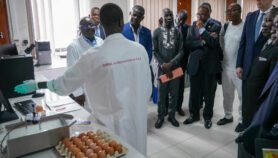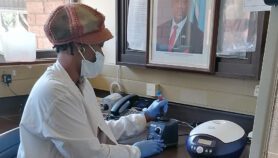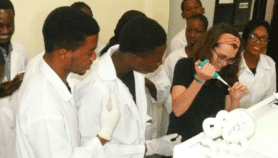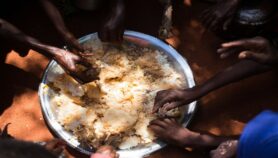By: Adanma Umeha
Send to a friend
The details you provide on this page will not be used to send unsolicited email, and will not be sold to a 3rd party. See privacy policy.
[LAGOS] Pharmacogenetics –understanding how a person’s genes responds to medicines – is not very popular, but Chinedum Babalola, first woman pharmacist to become a vice chancellor in Nigeria, says this is important and is leading research in this field in Nigeria.
Chinedum Babalola became the vice-chancellor of Chrisland University, Nigeria in 2017 and became Nigeria’s first female pharmacist professor to occupy this position. She has a long list of “firsts” in her life story.
In 2017, she was the only Black and African out of the nine scientists and social scientists of the strategy working group of the joint committee of the International Council for Science and International Social Science Council.
Babalola tells SciDev.Net of her efforts to promote health in Africa through research, and pharmacogenetics and talks about how young women researchers can succeed.
What are your research interests and the areas of pharmacy you have covered?
My research is focused on several aspects of medicines including pharmacokinetics — how drugs get absorbed in the body, move to other parts of the body, and eventually get removed from the body through excretion.
I also study actions of medicines in the body, and pharmaceutical analysis, which involves identifying chemical substances, removing impurities from them, determining the quantities and determining their molecular structures.
“Go ahead and apply for grants. Don’t give up if you fail.”
Chinedum Babalola, University of Ibadan
I am involved in studying bioethics, and how one’s genes influence how medicines work — pharmacogenetics.
I was involved in a collaborative study at the University of Ile-Ife, where we examined poor metabolisers and fast metaboliser of an antimalarial called proguanil in Nigerians. We found that about four per cent of Nigerians were poor metabolisers.
My study has discovered significant drug to drug interactions between antimalarials and antibiotics that results in considerable reductions in antibiotic levels requiring dose adjustment.
My colleagues and I published a pharmacogenetic study on health in Nigeria. It means that we can carry out genetic tests and tell people that with a gene they have, they would not process a drug very well. It was a great discovery.
You have had many firsts and are the now the first female pharmacist to become a vice chancellor in Nigeria. How did your journey begin?
I was born to parents who are teachers — Isaac Anyabuike, a doctor and the late Adeline Anyabuike. I am the first of five children, four females and one male. I had a lot of responsibilities.
My parents believed in education. My mom was a disciplinarian to the core. She gave me a strong mathematics foundation that I needed for science while I was in secondary school. I became a science student and then fell in love with pharmacy.
I obtained a bachelor of pharmacy from Obafemi Awolowo University, Ife, Nigeria in 1983. I later obtained a master’s in pharmaceutical chemistry in 1987 and a doctorate in pharmaceutical chemistry in 1997 at the same institution. I embarked on a postdoctoral fellowship at the University of British Columbia, Vancouver, Canada in 1995.
I started my academic career early. I was one of the few retained to continue a career in academics after my doctorate degree at the Obafemi Awolowo University. I began my career as a graduate assistant, and rose to become a senior lecturer.
I rose through the ranks both at Obafemi Awolowo University, Ife and at the University of Ibadan, Nigeria, to become a professor in 2006, a first for a female pharmacist in this institution. From then on, I have continued to be the first in so many instances.
Tell us about your scientific achievements
As a principal investigator, we won a MacArthur Foundation US$1 million grant to set up a Centre of Excellence – Centre for Drug Discovery Development and Production (CDDDP) in 2012. CDDDP was set up to empower Africans to make and regulate their medicines. The Centre has built capacity in Nigeria and has up to six new pharmaceutical products awaiting approval.
“I encourage young women to collaborate with those better than themselves in research to learn from them.”
Chinedum Babalola, University of Ibadan
The main thing we have done is to bridge the gap between academic institutions, medicine, and drug development. Today, we have three anti-COVID products.
What advice do you have for young female professionals?
I have been mentoring several female professionals. I encourage them to persevere in the face of adversity to succeed.
If you intend to marry, take your time and choose a man who will support you. If I did not have a supportive husband, I would not be able to achieve these things. I encourage young women to collaborate with those better than themselves in research to learn from them how to apply for grants. Go ahead and apply for grants. Don’t give up if you fail. With determination and God on your side, you will make it.
This interview has been edited for clarity and brevity.
This piece was produced by SciDev.Net’s Sub-Saharan Africa English desk.














